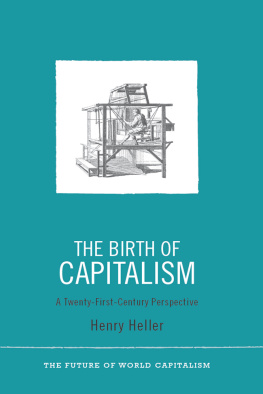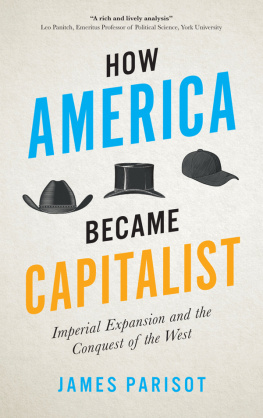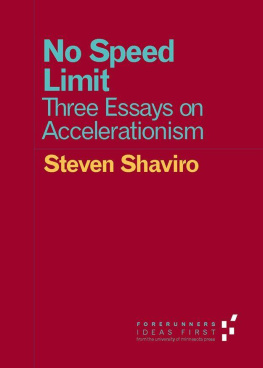WHAT PEOPLE ARE SAYING ABOUT
MALIGN VELOCITIES
Always deterritorialize! Or so goes the mantra of recent accelerationist theory. Intoxication against intoxication, schizophrenia against schizophrenia, delirium against delirium the accelerationist tendencies of millennial life are laid bare in this concise volume by the author who first suggested the term. From the historical avant-garde, through Detroit techno and science fiction, to Nick Land and the Cybernetic Cultures Research Unit (CCRU), Benjamin Noys reveals the ideological fantasies of speed. We should dismiss accelerationism for its capitalophilia, he concludes, but preserve it for its extremism: go far, go deep and go negative to get real.
Alexander R. Galloway, author of The Interface Effect
The notion that the worse, the better has an obvious appeal to disempowered communists in a time of capitalist crisis. Malign Velocities steps in and registers the futurist thrill of those theorists who would arrive at communism via an advanced, high tech capitalism and registers the often disastrous results of these accelerations, which took us more often to Stalinism or neoliberalism than to utopia. Noyss writing is erudite, clear, and coloured by the darkest humour.
Owen Hatherley, author of Uncommon
In the midst of a hair-shirt neoliberalism, with growth-rates stagnating and accumulation reliant on ever-deeper dispossession, the sirens of speed are once again luring the advocates of radical theory. Malign Velocities diagnoses the moment of accelerationism with exacting lucidity, revisiting prior iterations of the idea of an excessive exit from the clutches of capital from futurism to cyberpunk and uncovering these theories politicaleconomic unconscious, the accelerationists fantasy of labour. Noyss book is a model of dialectical critique, combining a sophisticated account of accelerationisms historical conditions of possibility with an incisive verdict about its incapacity to generate strategies adequate to this conjuncture of crisis. Malign Velocities succeeds in both being true to the materialist injunction not to tell oneself stories and in weaving an engrossing tale of theorys struggles with the limits and compulsions of capitalism.
Alberto Toscano, Reader in Critical Theory, Goldsmiths, and author of Fanaticism: On the Uses of an Idea
First published by Zero Books, 2014
Zero Books is an imprint of John Hunt Publishing Ltd., Laurel House, Station Approach,
Alresford, Hants, SO24 9JH, UK
www.johnhuntpublishing.com
www.zero-books.net
For distributor details and how to order please visit the Ordering section on our website.
Text copyright: Benjamin Noys 2013
ISBN: 978 1 78279 300 7
All rights reserved. Except for brief quotations in critical articles or reviews, no part of this book may be reproduced in any manner without prior written permission from the publishers.
The rights of Benjamin Noys as author have been asserted in accordance with the Copyright, Designs and Patents Act 1988.
A CIP catalogue record for this book is available from the British Library.
Design: Lee Nash
Printed and bound by CPI Group (UK) Ltd, Croydon, CR0 4YY
We operate a distinctive and ethical publishing philosophy in all areas of our business, from our global network of authors to production and worldwide distribution.
Acknowledgements
My ongoing conversations with Alberto Toscano have been vital to formulating this book. I have also benefited from discussions with Alexander R. Galloway, Matteo Pasquinelli, Armen Avanessian, John Cunningham, Oxana Timofeeva, Federico Luisetti, Ross Wolfe, Owen Hatherley, Harrison Fluss, Federico Campagna, Sami Khatib, Daniel Spaulding, Daniel Marcus, Steve Shaviro, Andrew Osborne, Jaleh Mansoor, and Anthony Iles. Hilan Bensusan was generous enough to invite me to speak in Brasilia on accelerationism and to guide me around the city. Alex Williams and Nick Srnicek were kind enough to share their pro-accelerationist work with an enemy, and to engage with debate over my arguments. Id like to thank Eugene Brennan for his close and careful reading of the manuscript. Anindya Bhattachryya helpfully supplied useful soundtrack suggestions. Dean Kenning deserves special thanks for providing the cover image. All errors are, as usual, my own. Above all, my thanks go to Fiona Price, for her support, criticism, and advice.
on the article Apocalypse, Tendency, Crisis, published in Mute: Culture and Politics After the Net 2.15 (2010). I would like to thank the editors of those journals for permission to reuse this work. I want to thank Mark Fisher for inviting me to the Accelerationism event, at Goldsmiths, on 14 September 2010, and for all those who participated in the resulting discussions. I also want to thank Matteo Pasquinelli and Armen Avanessian for inviting me to Berlin for the Accelerationism Symposium on December 14 2013 and for the papers and discussions on that day.
Preface
Speed is a problem. Our lives are too fast, we are subject to the accelerating demand that we innovate more, work more, enjoy more, produce more, and consume more. Hartmut Rosa declares that today we face a totalitarian form of social acceleration. Thats one familiar story. I want to tell another, stranger, story here: of those who think we havent gone fast enough. Instead of rejecting the increasing tempo of capitalist production they argue that we should embrace and accelerate it. We havent seen anything yet as regards what speed can do. Such a counsel seems to be one of cynicism, suggesting we come to terms with capitalism as a dynamic of increasing value by actively becoming hyper-capitalist subjects. What interests me is a further turn of the screw of this narrative: the only way out of capitalism is to take it further, to follow its lines of flight or deterritorialization to the absolute end, to speed-up beyond the limits of production and so to rupture the limit of capital itself.
To be clear from the start, I dont agree with this story. The core idea of this book originated in the early 90s, when I first encountered the work of Nick Land and the Cybernetic Cultures Research Unit (CCRU) while working on a thesis on Georges Bataille. This work, as I will discuss in , is the one of the most explicit statements of the desire to accelerate beyond capital. Formulated in the language of science-fiction and contemporary theory (particularly the work of Gilles Deleuze and Flix Guattari), Land and the CCRU rigorously abandoned any humanist residues. Land and his colleagues at the University of Warwick strove for a new post-human state beyond any form of the subject, excepting the delirious processes of capital itself. They claimed that the replication and reinforcement of capitals processes of deterritorialization of flux and flow would lead to a cybernetic offensive capital could no longer control. Reading this full-blown accelerationism alongside discussions of the New Right and their aim to dissolve the state led me, at the time, to coin the term Deleuzian Thatcherism.
It was the resurgence of these ideas in the 00s, including the republication of Lands essays, It turns out that term occurs in Roger Zelaznys sci-fi novel Lord of Light (1967), which Id read. The unconscious, as usual, works in mysterious ways. After my initial critical analysis a new wave of contemporary accelerationism emerged and it was this fact, especially as this took place at a time of capitalist crisis, that led me to write this book.









